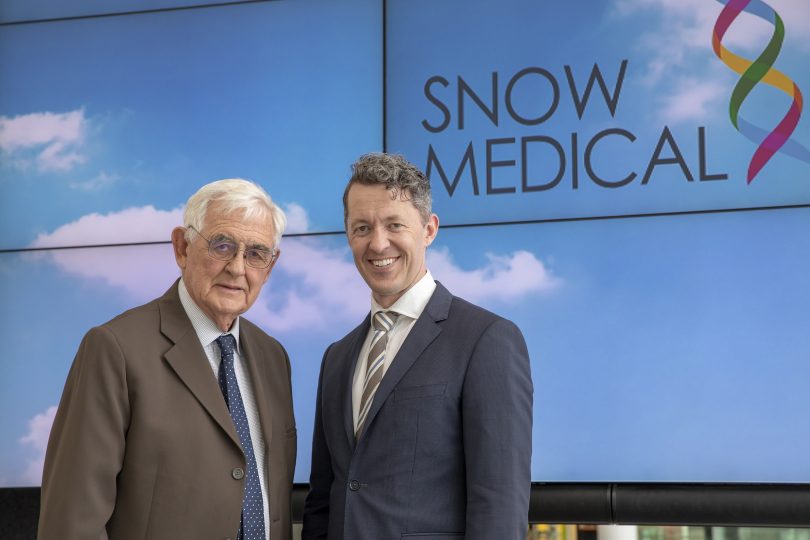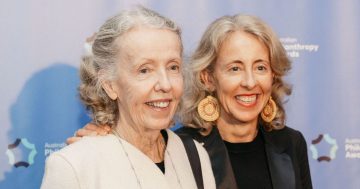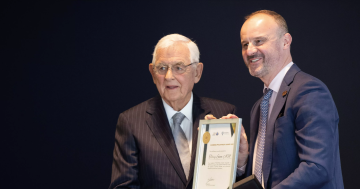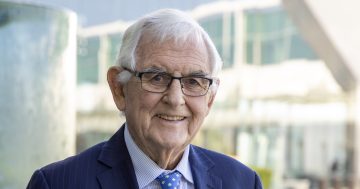
Dr Marian Burr is conducting revolutionary cancer research. Photo: ANU.
A British researcher is now bound for the Australian National University to continue her pioneering work into how the human immune system can hunt down and eradicate cancer thanks to an $8 million boost from Canberra Airport owner and property developer Terry Snow.
One of three inaugural Snow Fellows, Dr Marian Burr will join the John Curtin School of Medical Research (JCSMR) in May next year.
In December last year, the Snow family launched the fellowships through the Snow Medical Research Foundation. The foundation is dedicated to funding the brightest and best medical researchers from across the nation and from around the world.
Dr Burr said the fellowship, which provides $8 million over eight years, provided a tremendous opportunity for her to focus on unlocking the power of cancer immunotherapy – an emerging treatment which uses the power of a patient’s immune system to help hunt down and destroy cancer.
“Cancer immunotherapy is revolutionising the treatment of many cancers and is leading to dramatic improvements in survival,” she said.
Dr Burr will use her Snow Fellowship to build on her current research examining ‘immune checkpoint inhibitors’, or ICI, a therapy that activates T cells in the patient’s own immune system to find and eliminate cancer.
“It’s like shining a spotlight on the cancer cells which the T cells then see and target. ICI therapy can lead to long-term complete remission, even in patients with very advanced cancers,” Dr Burr said.
“What is so exciting is the incredible potential immunotherapy has to wipe out cancer that has spread to different parts of the body. And for some cancers, that’s a complete game-changer.
“Using cutting-edge technologies, my team will build on our recent discoveries to enhance immune targeting of aggressive cancers – such as lung cancer, melanoma and leukaemia – and to better understand the mechanisms cancer cells use to hide or shield themselves from the immune system.”
She said the Snow Fellowship offered a unique opportunity to establish a world-leading research laboratory at JCSMR with sustained funding to continue the research program.
”I am extremely honoured and grateful to be a Snow Medical fellow,” Dr Burr said.
ANU Vice-Chancellor Professor Brian Schmidt congratulated Terry Snow for his vision and generosity in establishing and funding the national Snow Fellowship program.
“At this important time of health and economic challenge for Australia, this is real leadership for our best and brightest young research leaders,” Professor Schmidt said.
“The Snow Fellowship has brought one of the world’s most promising early-career cancer researchers to ANU and Canberra – an outcome that would not only benefit Australia but the world.
“Cancer is a killer, and it has been a terrible killer for many years. But in Marian, cancer has a formidable enemy, and the work she will undertake as part of this research program will give hope to many both now and in the future.”

Terry and Tom Snow at the launch of Snow Medical, which they see as a game-changer for medical research in Australia. Photo: Supplied.
The Chair of the Snow Medical Research Foundation, Tom Snow, congratulated Dr Burr and the other two Snow Fellowship recipients.
“The Snow family are excited to unveil the Snow Fellowship program and to bring Marian to ANU. We are confident that establishment of Marian’s team in Canberra will accelerate the provision of advanced cancer care to the Canberra community.
“Marian’s unique skillset as a research pathologist, her exceptional track record at Cambridge, and the transfer and expansion of her research to Australia show she has the potential and determination to make a major impact in cancer treatment.
“We believe that with financial backing, Marian will produce paradigm-shifting research that wouldn’t otherwise be possible.”
The other Snow Fellows are Associate Professor James Hudson (QIMR Berghofer), who is researching the heart and heart disease with organoids, or miniature heart muscles, and a computer modelled, genetic encyclopedia of the heart, and Dr Owen Siggs (Garvan Institute of Medical Research), who is researching ways to combat autoimmune disease and improve the quality of life for patients.
Snow Medical has also opened applications for new fellowships.
Terry Snow said Australian scientists needed freedom to focus on their exceptional research and not worry about funding as they strive to deliver the breakthroughs the world needs.
“Invest in exceptional people, support the next generation of our research leaders, keep our best and brightest in this country – then Australia and the world can only benefit from a healthier future,” Terry Snow said.
“With the health and economic challenge Australia and the world face right now, we must invest in the brilliant minds among us who offer solutions for a bright future.
“For each of these scientists, $8 million is transformative funding that will change the course of their careers and give them the best chance to find cures, treatments and greater knowledge to benefit potentially millions of people’s health around the world.”
For more information, visit Snow Fellowships.















